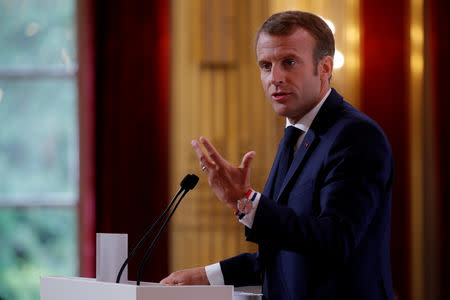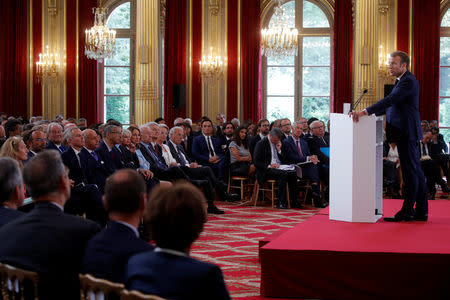Macron says Brexit cannot divide EU, criticises Trump's isolationism
By Michel Rose and Richard Lough
PARIS (Reuters) - President Emmanuel Macron on Monday said preserving European Union unity was more important than forging a close relationship with post-Brexit Britain, and hit out at what he called U.S. President Donald Trump's "aggressive" isolationism.
As pressure mounts on Prime Minister Theresa May to agree terms for Britain's divorce from the EU and the shape of their future trade relationship, Macron showed no sign of breaking ranks with other EU capitals.
"France wants to maintain a strong, special relationship with London but not if the cost is the European Union's unravelling," he told a gathering of French ambassadors.
Brexit, Macron said, "is a sovereign choice, which we must respect, but it can't come at the expense of the European Union's integrity".
Macron did not announce any major shifts in foreign policy in the annual address to his ambassadors, but spoke forcefully about what he labelled the "crisis of multilateralism" and the need to make Europe more "sovereign".
He urged Europe to exert itself as "a trade and economic power", which defends its strategic interests and financial independence and is able to fend off the extraterritorial reach of U.S. sanctions.
Macron also pressed the need for EU member states to show more solidarity.
"Italy is against the Europe which shows no solidarity on migration, but it is for the Europe of structural funds, or so it seems when I hear some ministers speak," Macron said.
"What is happening in Italy is our political doing, an absence of solidarity. Does that excuse xenophobic rhetoric? I don't think so," he added.
TESTS
In his first year, Macron banked on nurturing relationships with leaders such as Trump and Russian President Vladimir Putin, appearing engaged on the world stage but often remaining non-committal and trying to mediate without unsettling anyone.
That approach has been tested after Trump shunned Macron and other allies, pulling out of a global climate pact, imposing extraterritorial sanctions on Iran, and imposing tariffs on EU steel and aluminium.
"Multilateralism is going through a major crisis which collides with all our diplomatic activity, above all because of U.S. policy," he said.
"The partner with whom Europe built the new post-World War order appears to be turning its back on this shared history," he said. "Europe can no longer rely entirely on the United States for its security."
Macron also touched on conflicts in the Middle East. He described the situation in Syria as "alarming" and reaching a "moment of truth", and reiterated his call for broadened talks on Iran's nuclear activity.
On Libya, Macron expressed determination to see through a plan for elections to be held in December.
(Reporting by Michel Rose, Richard Lough and Brian Love; Writing by Michel Rose; Editing by Andrew Bolton)

 Yahoo News
Yahoo News 

